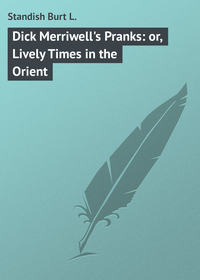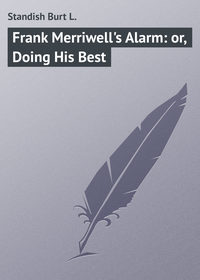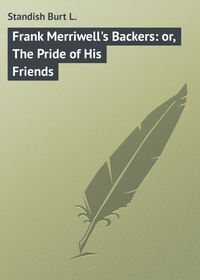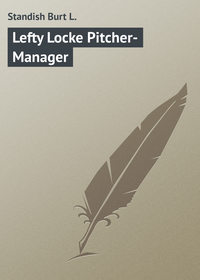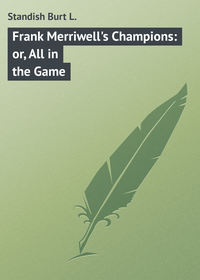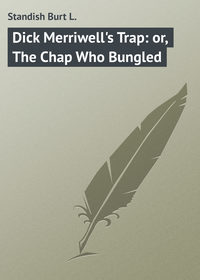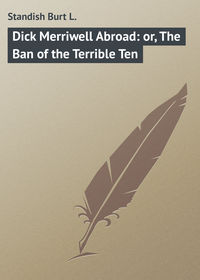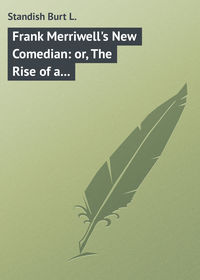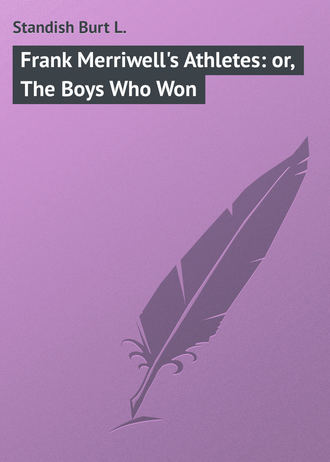 полная версия
полная версияFrank Merriwell's Athletes: or, The Boys Who Won
Finally three players on Whirling Bear’s side ran for a ball. Dunnerwust and Toots were two of them, and they both fell down, while an Indian fell on top of them.
Over the three sailed Bart Hodge, his bat poised and his teeth set. He reached the ball and kept it from striking the ground, but it glanced from his bat and went off sideways.
It went in a bad direction.
Whirling Bear tried to reach it, but failed, and it fell to the ground.
And now the sides were tied with the chances even for the final struggle.
CHAPTER XXIII – THE WRESTLING MATCH
Less than half a minute elapsed before the game was resumed.
The players went at it with unabated energy and enthusiasm, and the excitement was more intense than ever.
This round would settle it.
Whirling Bear was in a bad humor. Although one of the white lads had won the first set with a drive, it seemed to Whirling Bear that the second one had been lost because Hodge had not hit the ball as skillfully as he might.
In fact, Hodge had done well to reach it at all.
Frank and Whirling Bear both rushed at the ball and came face to face. As Frank struck, he saw the Indian swing his bat.
Whirling Bear did not strike at the ball, although he pretended to do so.
He struck straight at Frank Merriwell’s head.
Merry saw this and dodged.
He succeeded in hitting the ball, and he escaped Whirling Bear’s bat at the same time. The bat whizzed through the air.
In another moment Frank was ready to meet the Indian’s assault, but, seeing he had failed in the first attempt, the Pueblo darted away.
“That fellow is treacherous,” Merriwell decided. “He has a grudge against me for some reason, and I’ll have to keep my eye on him. If he had hit me, my skull would have been cracked.”
Inza witnessed Merriwell’s peril, and she caught her breath, uttering a little cry of terror. When Frank dodged, she breathed again, and she panted:
“Go for him, Frank – don’t let him get away!”
Whirling Bear, however, got away like a leaping cat, and continued giving orders to his men as if nothing unusual had happened.
Faster and more furious waxed the game. Spurred on by the shouts and yells of the spectators, each side was exerting itself to the very utmost.
It was really very exciting, and the skill of the players aroused the admiration of all. The Indians handled themselves in a remarkable manner, and, with one or two exceptions, the white boys were doing almost as well.
On Whirling Bear’s side Merriwell and Hodge were the most conspicuous among the white players, while Mulloy and Diamond showed great skill and judgment on the other side.
“Hurro!” the Irish lad was heard to shout. “It’s hot shtuff we are, an’ don’t yez fergit thot! Erin go braugh! Th’ United States an’ Ould Oireland feriver!”
For some moments there was a furious volleying, so fierce at moments that the eye followed the movements of the players and the flying ball with no little difficulty.
Inza Burrage was greatly excited. She clapped her hands and waved her handkerchief.
“Oh, aunt!” she cried; “it’s almost as good as a football game! Isn’t it just perfectly splendid!”
“It is confusing – very confusing,” said Miss Abigail, severely. “It seems to be a genuine savage game.”
At last Hodge saw his opportunity, and he drove the ball toward an opening in the ranks of the opposing players. It was skillfully done, and, almost before any one could realize it the game was over, Whirling Bear’s side having conquered.
Then the Indians danced and sang songs of victory.
Swiftwing seemed to take his defeat gracefully, and he insisted that the white boys, Merriwell and Hodge, and not members of his own race had brought it about.
Frank told Swiftwing that he was astonished to find the Indians played the game with so much skill.
“It is great sport,” he said. “I feel well satisfied for my trouble in visiting Taos.”
“You feel satisfied now,” said Swiftwing, in a peculiar manner. “You may not be so well satisfied when you depart.”
Frank was puzzled by this remark.
“I wonder what he means by that,” he muttered, as the Indian walked away.
“Begobs! Oi think he m’anes we’ll be beaten at iverything ilse we thry,” nodded Barney.
But Frank fancied that was not just what the Indian had meant.
The boys found the Indian who had charge of their clothes, and soon they were in sweaters.
Whirling Bear sought the party, and, standing with his hands on his hips, eying them insolently, he said:
“What white boy think he want to wrastle?”
“Gol darn his eyes!” muttered Ephraim, who did not like the appearance of the Indian. “I’d like ter thump him betwixt ther eyes!”
“What white boy dare to wrastle with Whirling Bear?” asked the Indian.
With a spring the impulsive Irish lad landed before the insolent redskin.
“It’s mesilf that’ll thry yez a whirrul!” he cried.
“You?” said Whirling Bear, contemptuously. “You no wrastle! Go ’way!”
That, as he afterward confessed, made the Irish boy “hot.” He told Whirling Bear he could stand him on his head in a minute.
“All right,” said the Indian, with a wicked gleam in his black eyes. “You strip off and try. Come.”
Immediately Barney began to “peel.”
“Look out for him,” warned Frank, assisting the Irish lad to get out of his sweater. “He is treacherous, and he dislikes all whites. I can see that. He may try to injure you seriously.”
“Oi’ll kape me oie on th’ spalpane, Frankie. Av he gits th’ bist av me it’s a smart chap he is.”
In a short time the Irish lad was ready.
The challenge had been heard, and there was a rush of the spectators to witness the wrestling match.
A ring was formed, and the crowd was kept back by some of the spectators who appointed themselves for that purpose.
Soon all were ready, and, at opposite sides of the ring, the white boy and the Indian crouched, their hands on their knees, watching each other like hawks.
Suddenly, as if moved by the same impulse, they rushed at each other and grappled.
Both obtained good holds, and a terrific struggle began.
Barney knew considerable about the science of wrestling, and he immediately discovered that the Indian was not a novice.
As soon as holds were secured Whirling Bear leaned heavily to the left and pinned Barney’s right arm close to the elbow, at once causing the Irish lad trouble.
Barney tried to straighten the Indian, but saw that Whirling Bear fancied he had an advantage and was determined to hold it.
Now the Irish lad knew that, for all that the redskin was bothering him by this trick, Whirling Bear could not be firm in such a position, and it would not be difficult to throw him if the trick came right.
Barney knew that a wrestler who leans to the left always lays himself open to the cross-buttock, and he immediately began to work to use that trip on his opponent.
In order to work the cross-buttock successfully it is necessary to have a hold that is loose at first and yet firm and then to move with the utmost rapidity. The least hitch or false move may prove fatal to the aggressor.
As the Indian and the Irish lad strained and squirmed and sought to trip each other, Barney worked his hold looser and looser, all the while watching for the opportunity he sought, although pretending to be working for something else.
The crowd watched the movements of the contestants with the greatest interest.
Dan Carver was on hand, and, after a moment, he offered to bet even money that the Irish boy would take the first fall. He was able to get up a small amount, and then, hands in pockets, he calmly regarded the contest.
Barney was tempted once or twice to try the trip, but was not quite satisfied with his opportunity. If he tried and failed, the Indian might throw him heavily by sharply jerking him backward.
Twice Whirling Bear jerked Barney forward to get him off his guard and then tried the inside click, but failed to throw the sturdy Irish youth.
This seemed to anger the redskin, for it was plain he had looked on the white boys with no small contempt, and had anticipated securing an easy victory.
Furiously he went at Barney, and this gave the white boy the very opportunity he sought.
Quick as thought Barney turned his left side toward his opponent, got his hip partly beneath him, and then, with a rapid movement, crossed both his legs and lifted him from the ground.
Down went Whirling Bear, with Barney uppermost!
It was a pretty fall, and it awoke the admiration of the spectators so that they cheered the Irish lad heartily.
Barney sprang up, but the Indian arose almost as swiftly, and, before any one realized it, the struggle was on again.
This time Whirling Bear was fiercer than before. The muscles stood out on his bare limbs and back, while the cords of his neck were drawn taut and there were knots in his forehead. The look on his face was not pleasant to see. He looked as if he longed to murder the Irish lad.
Frank was watching every movement closely. He was well pleased with Barney’s success, but it seemed that the Indian had been taken by surprise, and it was doubtful if the Irish boy could repeat the trick.
Barney tried the backheel trip, and his failure to throw Whirling Bear nearly resulted in his own downfall.
Next Barney attempted the hip stroke, but that was another failure, and Whirling Bear now seemed like a cat on his feet.
All the while Barney was forced to look out for various trips and heaves which the Indian attempted in rapid succession.
Some one offered to bet Carver even that the Indian took the second fall, and the sport shook his head.
“I knew the Irishman was going to surprise him at the start,” he said. “Now he is out for blood. I’ll go something he takes this fall.”
All at once, in some astonishing manner, the Indian got under Barney and raised him into the air directly across his back.
Then Whirling Bear lifted Barney above his head to hurl him to the ground!
CHAPTER XXIV – THE FOOT RACE
Frank saw a gleaming spirit of evil in the eyes of the savage.
Whirling Bear meant to injure, perhaps to kill, Barney.
He intended to cast the Irish youth down upon his head, and the prospect was that Barney’s neck would be broken instantly.
Immediately Frank leaped forward.
As the Indian dashed Barney to the ground, Frank caught him and kept him from falling on his head.
The Irish lad went down heavily, but he was not severely injured.
Whirling Bear gave a cry of anger when he saw what Merriwell had done, and then rushed at Frank.
Frank dodged and tripped the Indian with the greatest skill, so that the redskin was pitched forward on his face and stunned for the moment.
“If you will try the copper-skin a whirl, I’ll back you for any amount,” said Dan Carver, quietly.
Whirling Bear sat up, savagely glaring at the white boys.
“No can wrastle with two!” he growled. “One at time is ’nough. Why other white boy do something?”
“I simply kept you from murdering my friend,” said Frank. “You were trying to break his neck, and I saw it.”
Whirling Bear got up, looking disgusted.
“Sometime may get ’nother chance,” he said, and then walked away, paying no heed to the spectators who were calling for him to remain and settle the match by seeing who could get the third fall.
“Begorra! it’s a roight nate thrick he did whin he lifted me inther th’ air,” confessed Barney. “Sorry a bit do Oi know how he did it at all, at all!”
“I do not think I ever saw a throw made in that manner,” confessed Frank. “He went under you like an eel, and brought you up across his back and over his shoulder.”
“He is the champion wrestler of the Pueblos,” declared a spectator. “I did not fancy you would be able to throw him at all.”
“You should be proud to say you broke even with him,” declared another.
Frank felt a hand on his arm, and a voice said in his ear:
“The sun priests are resting. While they rest there will be a footrace, the same as white men run. Will you enter. Swiftwing says you are a great runner.”
The speaker was a young Indian of evident intelligence.
Frank was willing and ready to take part in the footrace, and he immediately accepted the invitation.
“I know I shall be pitted against Swiftwing,” he thought, “and it is liable to be the race of my life, for he can run like the wind. I will beat him – or die!”
A straight course of nearly a quarter of a mile was prepared, and the spectators ranged up on either side near the finish.
There were five starters, four of whom were Indians. Merriwell was the only white persons who had been invited to take part.
The Indians were stripped for the race, as they had been in taking part in other sports.
Frank brought out a pair of running shoes, and these he put on. He removed his sweater and stripped down to a light, sleeveless undershirt.
As they stood side by side, Swiftwing spoke to Frank.
“Much depends on this race,” he said – “much more than you can know. Beat me, Merriwell, if you can. You will be sorry if you fail.”
All this was very mysterious, but Frank returned:
“You may be sure I shall do my best to beat you.”
A moment later a great shout went up from the spectators.
The runners had started, darting off from the scratch like so many deer.
Swiftwing started in a most astonishing manner, seeming to leap off at full speed in a second.
Frank was not slow in starting, but he found the Indian had gained a slight advantage at the outset.
It was a beautiful sight to see the five runners come speeding along the track, heads up, breasts thrown forward, nostrils dilated and eyes flashing.
Of them all, two persons seemed to fly over the ground with very little exertion.
They were John Swiftwing and Frank Merriwell.
At Frank’s side ran a tall Indian who was making great speed, but did not seem as graceful as the white boy or the Indian in advance.
Although Swiftwing had gained an advantage at the start, he was not able to widen the distance between himself and the white boy. Close behind him he could hear the feet of Frank Merriwell.
And Frank? He was preparing for one mighty spurt at the last of the race, feeling that he would surprise Swiftwind then.
The spectators cheered wildly, and some enthusiastic cowboys fired shots into the air, yelling for the white boy to run faster and not let a “copper-skin” beat him.
Far ahead at the end of the course Frank saw Inza Burrage watching their approach. Near her stood an Indian who had just dismounted from the back of a magnificent horse, which he was holding.
Inza waved her handkerchief.
Was it a signal to Frank? or was it meant for John Swiftwing?
“In either case,” thought the white boy, “it is enough. I will win!”
He set his teeth and gave a great spurt that must have carried him into the lead; but, at that moment something happened.
The tall Indian who had been racing at Frank’s side thrust out a foot and neatly tripped Merriwell up. This happened at the very moment when the white boy started to spurt, and Frank was flung into the air and hurled forward upon his head. His hands were thrust out to break his fall, and he saved himself in a measure, but he was stunned and lay motionless for some seconds.
With a gasp he sat up.
“Beaten!” he hoarsely grated – “beaten by a foul trick! I did not think John Swiftwing would have anything to do with a plot of this sort!”
Then he saw something that caused his heart to give one mad leap and stand still.
Swiftwing reached the end of the course. As he rushed over the line, without pausing, he caught Inza Burrage about the waist, swung her into the air, tossed her over his shoulder, and —
How was it done? An instant later the Indian was astride the horse which the other Indian had been holding ready for him. He still held fast to Inza. Frank heard her scream with sudden terror, and the cry was drowned by a hoarse sound from Swiftwing. Like an arrow leaving the bow, the horse, bearing its double burden, shot away.
CHAPTER XXV – JOHN SWIFTWING’S FAREWELL
“White Dove, we are alone in the mountains, where neither friend nor foe can reach us. Here we will stay. Soon the sun will seek his bed to rest, and the night will smile down upon us from its starry eyes, while it breathes a soft breath to smooth the ruffled feathers of the White Dove. You must have no fear of day or night, for I am with you, and I will guard you as the she-bear guards its cubs.”
Inza Burrage, her face tear-wet, her hair tumbled and tangled, her clothing torn in two or three places, turned her gaze reproachingly upon John Swiftwing.
“It is not the day or the night that I fear,” she said, slowly, with a dignity that was womanly. “I do not fear the dangers of the mountains. Wild beasts have no terrors for me now. And still my heart is frozen within me, and all my body is like ice.”
They were standing on a small plateau, where they could look away across a plain that lay below them. The sun was in the western sky. Behind them the sweat-stained horse that had brought them thither was feeding.
“Why should your heart be frozen and your body like ice?” asked the Indian, gently, his voice soft and musical, and a light of tenderness gleaming in his eyes.
“Because, John Swiftwing – because I fear you!”
“The White Dove should not fear me, for I will guard and protect her with my life. I will face any peril in defense of her.”
He took a step toward her, but she drew back, flinging out her hand.
“Stop!” she gasped. “Please – please don’t touch me! I want to talk to you – I wish to beg you to be merciful and take me back to those from whom you carried me away!”
He folded his arms and looked at her in silence. It was an unconscious pose, and never had he looked handsomer than at that moment. After a little silence he spoke:
“Why should I take you back?” he asked. “I love you, and I want you for my mate. You shall be my mate. You shall be my wife, White Dove. We will live together in some beautiful valley, far away from all the world – live in a little nest that I will find for you. The sunny days will glide by like a soft-floating stream, and every starry night shall be a dream of happiness.”
“No! no! no!” she cried, with her hands outflung. “That could not be!”
“Why not?”
“Because – oh, because!”
“White Dove, don’t you love me?”
“No! no! no!”
“Then your eyes have deceived me, for I fancied I saw love deep down in them. It must have been the reflection of the love that was in my heart. But still I know there was encouragement in them. They spoke like words.”
“And this is my punishment!” sobbed the poor girl. “Oh, Mr. Swiftwing, it was not love – it was admiration! I thought you so brave and so noble! I did not dream you could do such a wicked thing as you have done! No one could have made me believe it was in your heart. I would have defended you against the tongues of all accusers. But now – how my idol is shattered!”
He shrank beneath her words, as if they were blows from a whip. For a moment he cowered, and then he lifted his head with an angry, defiant toss.
“They told you,” he said – “they told you the red streak was in me! They were right! I heard them say it! They told you that my heart was the heart of an Indian, even though I wore white man’s clothes and read white man’s books. They were right! They told you all the education I might receive would not change my nature. They were right! God made the white man, and He made the Indian. He did not make them alike, and what God has made man cannot change. The white man took me to give me an education. Bah! What is an education to me? What would it mean if I had the finest education that the white man could give me? I would still remain an Indian, and, with all my education, I would turn back to my people, live as they live and die as they die – no better. I have thought it all out. I have thought it is no use to try to be anything but an Indian. The fight is ended! I am an Indian again!”
Inza’s heart was full of despair.
“I will not believe you are as bad as you think!” she cried. “I saw something noble in your face, and I think it came from your heart. See, Swiftwing – on my knees I beg you to take me back to my friends! I know you will not refuse me! Take me back to them, and always will I remember you with gratitude. Always will I think of you as noble and true when the great test came!”
Thus she entreated him, and the pleading of her face and eyes was more than her words. He stirred uneasily.
“You do not love me?”
“No! no!”
“You love Frank Merriwell?”
“Yes! I think more of him than any one else.”
“I would be a fool to give you up to him now. I would be a fool to take you back to him when I have you safe. If I did that, I would not be an Indian. I love you.”
She continued to entreat him to take her back, and her words were wonderfully eloquent. He stood like an image of stone, his brow dark, his arms folded, looking down at her. She grew weak with fear, for she could see nothing of relenting in his face. Tears rained down her cheeks and she wrung her hands. He turned away.
“Give me time to think,” he said.
For a long time he stood there, looking down upon the plain, moveless as a thing inanimate. She prayed that his heart might be softened.
At last he turned and held out one hand.
“White Dove,” he said, and his voice was as sweet and gentle as the murmur of a brook, “come to me.”
Somehow she did not fear him then. She arose and went, to him, permitting him to take her hand.
“Look,” he said, pointing toward a black speck upon the plain, “there is Frank Merriwell! He is coming for you! He is on my trail, but I could take you where he could never find us. Instead of that, White Dove, I am going to take you down there to meet him!”
She gave a scream of joy.
“Oh, you dear, good fellow!” she cried, once more like a girl. “I could hug you for that!”
“Don’t do it!” warned John Swiftwing, hoarsely. “I might change my mind!”
She waved her handkerchief, and the black speck on the plain fluttered something white. The black speck was moving, and dust arose in a tiny cloud behind it.
“He has seen us,” said the Indian. “Come on; we will go down.”
He led her to the horse and lifted her upon the animal’s back. Then he led the horse down the mountain to meet the trailer.
The sun was low when they met. Frank Merriwell had a rifle in his hands, and it was aimed straight at the Indian’s heart.
“Up with your hands, Swiftwing!” he ordered, sternly. “Don’t try anything crooked, for a hundred armed men are coming behind me, and they have sworn to hunt you down like a dog.”
The redskin smiled scornfully.
“If they were a thousand it would make no difference,” he said. “They could not find me. I will not put up my hands, Merriwell, so shoot if you wish!”
“Don’t shoot, Frank!” screamed Inza. “He saw you coming, and he brought me to meet you!”
“Brought you to meet me?” repeated Frank, doubtingly. “Why should he do that?”
“He is going to give me up – going to let me go back with you.”
“Is that right, Swiftwing?”
The Indian bowed.
“The White Dove speaks straight,” he said, quietly.
“But – but I do not understand! They said the only way to save her was to kill you – that you were like all Indians, and – ”
Swiftwing seemed to cringe a bit, and the black look on his face deepened.
“They were wrong,” he said. “To-day I am not an Indian – I am a fool! Tell them I was a fool, and I brought the White Dove to meet you! Do you know what I have done, Merriwell? I will tell you. By giving the White Dove up after taking her away as I did, I shall win the contempt of my people. They will look on me as a coward! They will spit on me with scorn! They will say I have the heart of a chicken! With them I shall be an outcast and a thing of contempt. Is it nothing? I have done this for you – and for the White Dove. I thought she loved me; she says she does not. Take her – take her away. Never shall I look on her again! Farewell, Merriwell!”
“Your hand, John Swiftwing!” cried Frank. “Your heart is all right, after all! Old fellow, I’ll see you this fall, when we play Carlisle again!”


